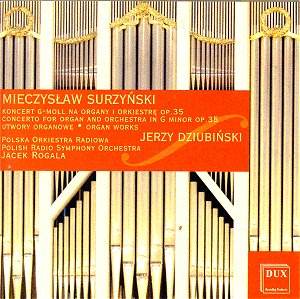Surzynski came of a
musical family from the west of Poland.
He studied in Berlin and Leipzig before
returning to Poznan. He then felt the
need for further study and enrolled
at Regensburg School of Church Music.
During the 1890s he held various church
organist posts at Libawa, Kiev, St Petersburg
and Saratov.
The Organ Concerto
dates from 1904 and was thought to have
been irretrievably lost in the 1939
fire at the Warsaw Philharmonic. In
fact a copy was stored at Poznan University
and this was discovered by Jerzy Golos
in 1990. It is a prime cut late-romantic
concerto in which taut control is balanced
with excellent melodic invention - sample
the sauntering elegance of the start
of the Intermezzo (tr.2).
The sighing and lightly yearning romantic
lines are shared between Gothic organ
and supine orchestra. Dvořák and
Franck seem to be Surzynski's heroes
but their voices are moderated by the
light touch of Mendelssohn. Of
the pieces for solo organ the most substantial
is the sonata in D minor. Each shows
a taste for Gallic smoothness and a
fruity grandeur. The Improvisation is
the most lively. It is in three parts
with a flighty airborne Capriccio
and an almost syrupy Chant triste
which suggests the pathos of Tchaikovsky.
Surzynski never cloaks his gift for
direct talking melody in academic profusion
or complexity.
Think in terms of a
Polish Guilmant. Surzynski proves himself
a Gallic-inclined songsmith for the
organ.
Rob Barnett
